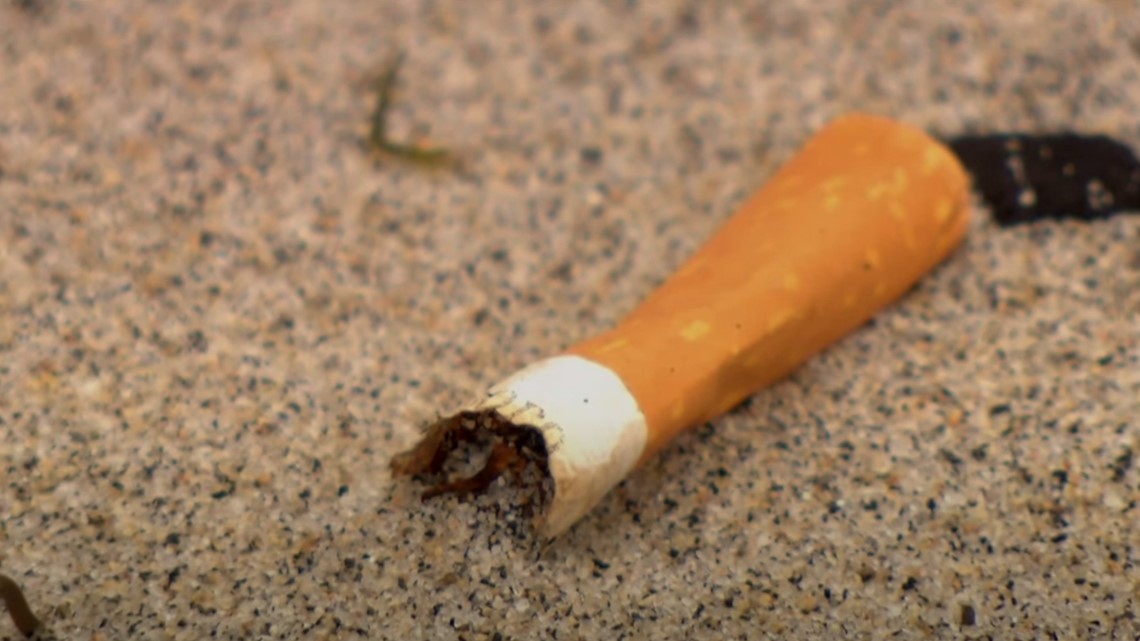
CBS 8’s Chief Meteorologist Karlene Chavis breaks down how to filter out our oceans biggest problem: cigarette butts.
SAN DIEGO — Beach cleanups are common along our coastline, and the most reported pollution problem are cigarette butt filters. They are a costly health hazard for not just us, but the environment.
Travel from storm drains to beaches
Whether the filters are put out in the sand or make the journey inland from areas like Downtown San Diego through storm drains, they will also find a way onto our beaches. I took a stroll along the sands of Ocean Beach with Mitch Silverstein. He is with the San Diego Chapter of the Surfrider Foundation. It did not take long to find cigarettes butt, and I mean a lot of cigarette butt, pollution.
“How far did we walk? 100 feet and we got 50 butts. That’s crazy. It’s nuts, it’s nut balls,” said Silverstein. “The beach is not an ashtray.”
I asked Silverstein and Dr. Thomas Novotny, who was also present for this all too familiar show and tell, what do you say to people who believe “well I’m only putting out one cigarette butt, where’s the harm?”
“One, there’s six trillion cigarettes manufactured globally, you put one, the next guy puts one, the next million people put one, and what we find is that a third of all the beach litter picked up from the beaches is cigarette butts,” said Novotny.
Number 1 marine pollution
Novotny is the Professor Emeritus at the San Diego State University School of Public Health. This environmental concern is echoed by many organizations including the National Oceanic and Atmospheric Administration, known as NOAA, citing cigarette butts as the number one marine pollution in the world.
Novotny refers to cigarettes as a teabag of toxins citing the seven thousand chemicals found in them, including 50 of which are capable of causing cancer. And to top it off, these filters, that have all those toxins locked in, are single use plastics. Don’t let the appearance of a paper lining fool you.
“The filter, which is the most picked up item of the cigarette butts is plastic. It doesn’t bio-grade, it stays in the environment. It gets squashed, broken up into small pieces and is retained as microplastics in the environment as well. Both have a chemical and plastic pollution with cigarette butts,” said Novotny.
Microplastics
To better illustrate how microplastics get dispersed into our environment, Mitch Silverstein uses a piece of Styrofoam as an example.
“It is the most easy to see example of how one piece of plastic, this from a cooler, instantly turns into thousands and thousands and thousands of pieces. It becomes indistinguishable from the sand,” said Silverstein as he breaks apart the chunk with his hand.
Once broken down, but not gone, the microplastics associated with cigarette filters become imbedded in our environment and even us.
“It’s also a sponge for toxins. So, it soaks up toxins. Fish eat it and we eat that fish, and we get those toxins, and we get that plastic. So, we’re eating it,” said Silverstein.
Taking action
When it comes to putting out this issue, Novotny advocates for an upstream way of preventing this top pollution. He wants legislation passed that would ban the sale of filter cigarettes, citing the filter itself has no health benefits.
“It is not just the environment, if we can reduce tobacco use in any way, even a small percentage we are going to improve the health of Californians, reduce the cost of healthcare, reduce the cost that is involved in cleaning up beaches and urban environments and just spoiling the natural environment that we have,” said Dr. Novotny.
Mitch Silverstein echoes this sentiment on the ban with involvement on a local and State level.
“We can try to blame litterbugs all we want, but at the end of the day, we need to hold the producers responsible and we need to prevent every single cigarette from having a plastic butt, where evidence is overwhelming that it’s hazardous waste and highly likely to end up in our environment,” said Silverstein.
Unfortunately, on a State level, a bill is introduced during every legislative session that never makes it out of the committee process. Mitch says pushing for this policy change is going to come down to the data, and we can help.
“We have a great tool, Surfrider — any individual can have an account and add to the data that we collect because we need to show policy makers the data. You know, not just come out and say, “hey, you know I feel like the ocean is being polluted”. We know it and we have the numbers to back it up.”
WATCH RELATED: Students practice conservation with Trout in the Classroom (April 2022).
